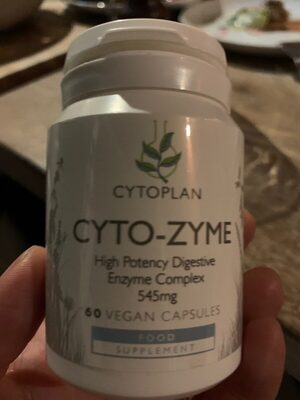Viewed 6 times...
Cyto-Zyme
Short Description
Cytoplan Cyto-zyme Digestive enzymes are catalysts which break down food into its basic components, so that our bodies can absorb the nutrients they require to build cells, tissues and organs. A catalyst is a substance which increases the speed of a chemical reaction without being changed by the reaction. The enzymes we need to digest our food are either created by the body (digestive enzymes) or are already present in the food when it is eaten (food enzymes). Food enzymes are killed when food is cooked to over 118 degrees. The same is true for micro-waving and processed foods. Digestive enzymes are secreted from the pancreas into the stomach and small intestine. These include protease, which breaks down proteins, amylase for breaking down carbohydrates, lipase for the breakdown of fats and cellulase for fibre. Enzymes are the body's workers. They are responsible for constructing, synthesizing, carrying, dispensing, delivering and eliminating the many ingredients and chemicals our body uses in its daily business of living. They are used by every organ, system and tissue in the body. Our body makes enzymes. When we are young our body has an abundant supply of enzymes, and at this time our energy levels seem never ending. As time goes by, we slowly begin to lose this efficiency. The signs we begin to notice are things like not being able to eat the spicy foods we have eaten and loved for many years, being less able to recover quickly from aches and pains of weekend sports, and reduced stamina. This reduced vitality signals a weakened and compromised body. All the above are signs that you are running short of the enzymes you need to fuel your life. The reason why we run short of enzymes is a lifestyle problem. Our poor dietary habits, fast food obsessions and excessive intake of fat and sugars all require large quantities of enzymes. Stress kills and damages cells, resulting in our enzyme-making machinery having to work overtime to help rebuild and replace them. Environmental pollution causes continuous cellular insult and damage requiring the ongoing assistance from enzymes just to maintain a healthy immune system. As we age our natural production of enzymes de- clines and it is recognized that during illness our enzyme production can be significantly reduced. The same enzymes which help us digest our food can also be used for other essential body activities. If the food we eat is high in its own enzyme content, as is raw food, its digestion requires less support from the body's own enzyme supplies. If our food is mainly higWy processed it will require a large number of enzymes from the body's resources to facilitate its digestion. Digestion takes priority of purpose in the enzyme hierarchy. Therefore if our food intake is devoid of its own enzyme content and requires vast input from our body supplies, this could mean enzymes being called away from their immune supporting and other equally essential roles to help the body digest food. If this situation is ongoing you can begin to see why a body becomes compromised and has less disease fighting capacity. Equally, if you notice digestive symptoms such as bloating, food intolerances, discomfort after eating, cramping and any other similar related digestive symptoms, it is likely your body is not able to provide sufficient digestive enzymes for the food you eat. If you do experience digestive symptoms it is always a good idea to change your diet to eat as much raw fresh (enzyme-rich) food as possible in small, frequent amounts. You might also consider taking a good broad-spectrum digestive enzyme formulation. Cyto-zyme provides a broad spectrum of plant-sourced enzymes, which digest protein, fat, fibre, dairy sugars and carbohydrate. The advantage of plant- sourced enzymes is that quality control is assured and contamination is significantly reduced when compared to enzymes from animal sources. Natural plant enzymes give high bioavailability and are readily accepted by the digestive tract. We have chosen enzymes which are largely resistant to degradation by the hydrochloric acid in the stomach so they may easily reach the small intestine where most digestion takes place. Equally these enzymes are active in a wide range of pH and temperature (to allow for individual variations.) Bromelain and Protease assist in the breakdown of food proteins into amino acids and polypeptides. Lipase helps with the efficient digestion of fats and oils. Amylase is required for the complete digestion of carbohydrates Betaine Hydrochloride supports the stomach environment and aids in the fIrst stage of the breakdown of all food ingested. Papain helps to digest protein Lactase digests lactose or dairy sugars Cellulase digests fibre from soluble sources High Potency, broad spectrum, digestive enzyme complex.Long Description
| Details: | |
| Wikipedia: | Visit |
| Manufacturer: | ? |
| Origin: | |
| Barcodes: |

| Nutrition Facts | |||
|---|---|---|---|
| Serving Size: | |||
| Ammount per Serving: | |||
| Calories: | kcal | ||
| Details in % | Daily Value | ||
| Total Fat | % | g | |
| Satured Fat | % | g | |
| Trans Fat | % | g | |
| Polyunsatured Fat | % | g | |
| Monounsatured Fat | % | g | |
| Cholesterol | % | mg | |
| Sodium | % | mg | |
| Potassium | % | mg | |
| Total Carbohydrate | % | g | |
| Dietary Fiber | % | g | |
| Sugars | % | g | |
| Other carbohydrate | % | g | |
| Protein | % | g |

